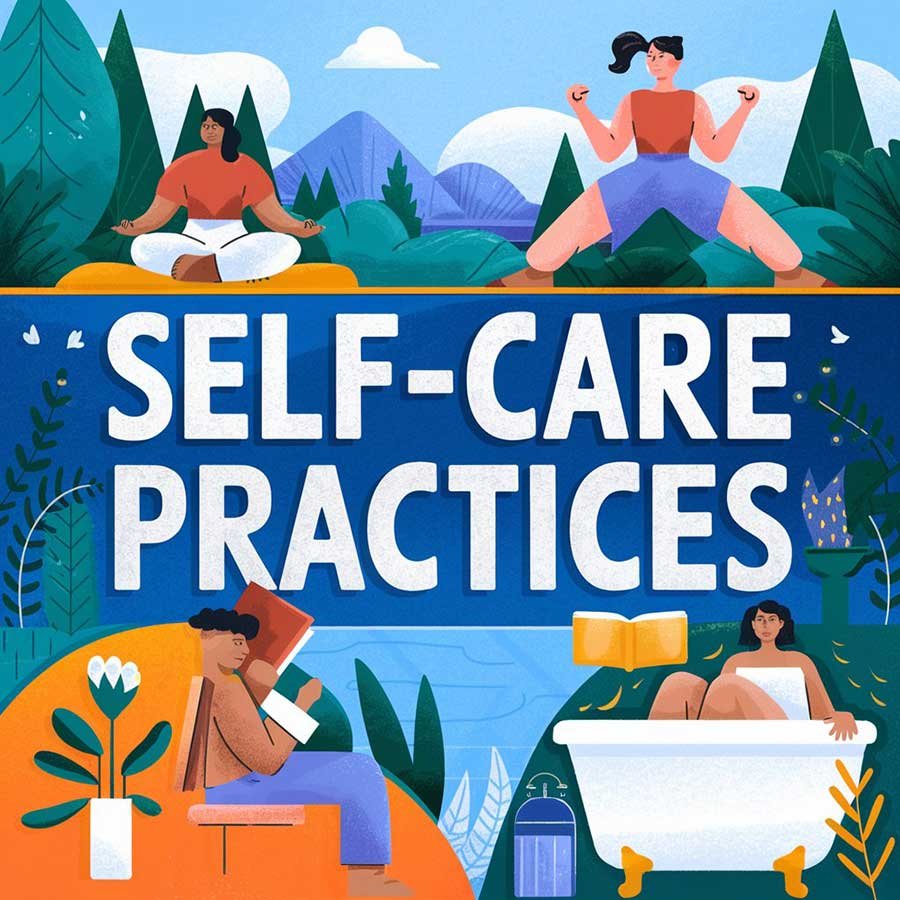
Self-Care Practices
Self-care is an essential part of maintaining mental, emotional, and physical well-being. Incorporating regular self-care practices into your daily routine can reduce stress, boost productivity, and improve overall quality of life.Whether you have a few minutes or a whole day, prioritizing yourself is key to long-term happiness and health.

Why Self-Care Matters
Taking care of yourself isn’t selfish—it’s necessary. Benefits of self-care include:
- Reduced stress and anxiety
- Increased emotional resilience
- Improved physical health and energy levels
- Enhanced focus and productivity
- Stronger relationships due to better emotional balance
Types of Self-Care
1. Physical Self-Care
Your body needs attention just as much as your mind. Ways to practice physical self-care include:
- Getting 7-9 hours of quality sleep each night
- Eating nutrient-dense foods for sustained energy
- Engaging in regular physical activity (walking, yoga, strength training)
- Staying hydrated throughout the day
2. Emotional Self-Care
Emotional well-being is vital for managing stress and maintaining mental clarity. Try:
- Practicing journaling to process thoughts and emotions
- Engaging in mindfulness or meditation to stay present
- Setting healthy boundaries to protect your peace
- Seeking support from friends, family, or a therapist
3. Mental Self-Care
Keeping your mind sharp and engaged contributes to long-term well-being. Ways to boost mental self-care include:
- Reading books or articles that inspire and educate you
- Learning a new skill or hobby to stay mentally active
- Limiting social media and digital distractions
- Practicing positive affirmations to foster a strong mindset
4. Social Self-Care
Healthy relationships are a key component of well-being. Ways to nurture connections include:
- Spending quality time with friends and family
- Reaching out to loved ones regularly
- Joining social or community groups for support and connection
- Practicing active listening in conversations
5. Spiritual Self-Care
Connecting with something greater than yourself can provide a sense of peace and purpose. Spiritual self-care can include:
- Practicing gratitude and reflection
- Engaging in prayer, meditation, or quiet contemplation
- Spending time in nature to feel grounded
- Volunteering or contributing to a meaningful cause
How to Incorporate Self-Care into Your Daily Routine
Many people struggle to make time for self-care, but even small actions can have a big impact. Here’s how to integrate self-care into your routine:
- Start small: Dedicate just 5-10 minutes a day to self-care activities.
- Schedule it: Treat self-care like an important appointment.
- Listen to your needs: Adapt self-care practices based on how you’re feeling.
- Be consistent: Regular self-care leads to long-term benefits.
Self-Care Myths Debunked
Myth 1: Self-Care Is Selfish
- Fact: Taking care of yourself allows you to be more present and available for others.
Myth 2: Self-Care Is Expensive
- Fact: Self-care doesn’t have to cost anything—many effective practices, like deep breathing and nature walks, are free.
Myth 3: There’s No Time for Self-Care
- Fact: Even small, intentional moments of self-care can make a difference.
Picture This
Imagine waking up feeling refreshed, calm, and ready to take on the day. Your energy levels are high, your mind is clear, and you feel emotionally balanced. By prioritizing self-care, you create a lifestyle that supports your happiness and well-being.
What’s one self-care practice you can start today?
Please Share This Article
If you found this guide helpful, please share it with others who might benefit from incorporating self-care into their daily lives. Taking care of yourself is the first step toward a more fulfilling life!






